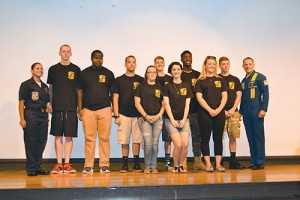
BERLIN – When Andy Talbott was four years old, he decided he wanted to fly fighter jets.
Nearly three decades later, that hasn’t changed. Instead of admiring them from the ground though, he’s living his childhood dream as a member of the U.S. Navy’s Blue Angels.
Talbot, 31, shared his story with a group of ROTC students from area schools at Stephen Decatur High School in advance of last weekend’s air show.
“I’m not here to recruit you,” he said. “I’m here to talk about the mission of the Blue Angels. We’re here to inspire a culture of excellence.”
Talbott, who flies the No. 3 jet for the Blue Angels, spoke to the students of his years-long journey toward becoming a pilot. Though he’s been in the Navy for 11 years and is now a lieutenant, Talbott stressed that he wasn’t trying to encourage students to join the military but rather to choose a career and devote themselves to it, whatever it might be.
“You can do anything as long as you give 110 percent,” he said.
Talbott encouraged the students, who ranged from freshmen to juniors, to figure out early what they wanted to do with their lives. He told them how he’d stuck with his plan to become a fighter pilot even when everyone in his small Kansas town told him it couldn’t be done.
“Don’t take no for an answer,” he said.
Talbott said he worked hard in school — he still remembers each of his teachers — and did whatever was necessary as he struggled to reach his goal of becoming a pilot, whether it meant tutoring or even summer school.
“Talent will only take you about 30 percent of the way,” he said.
He also spoke about the importance of making good choices and avoiding the problems that came with drugs and alcohol.
“Don’t close any doors,” he said.
Talbott said it was just as important for the students to surround themselves with good people, those who were also heading in a positive direction with their lives. He described how he’d had to distance himself from a childhood friend who, though talented, had gotten into dealing drugs.
“This guy could have done anything in the world,” he said.
Though Talbott tried to keep Friday’s speech motivational, when it came time for questions students wanted to know the details of his naval career. They focused on the aircraft carriers he’d worked with and the planes he’d flown. He told them the F-18 was the fastest plane he’d flown — it could make the trip from Maryland to California in four hours if provided with fuel in the air — and gave them an idea of what it was like to fly in formation.
“Everybody raise your hand,” he said. “Now look up. In about six hours, I’m going to be flying an aircraft that distance away from another aircraft.”
That, he said, showed the amount of trust and teamwork involved in being a member of the Blue Angels. Even when they’re not in the air, because the Blue Angels are on the road 300 days a year, respect and cooperation among the team members is critical.
“Your attitude is huge in everything you do,” he said.
Talbott and his fellow Blue Angels will participate in close to 70 demonstrations at air shows throughout the country in 2015.
